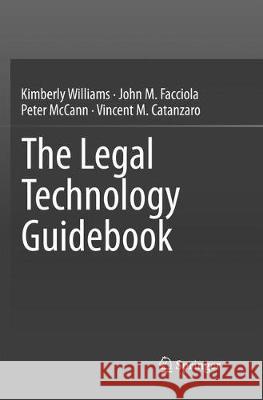The Legal Technology Guidebook » książka



The Legal Technology Guidebook
ISBN-13: 9783319854144 / Angielski / Miękka / 2018 / 142 str.
The Legal Technology Guidebook
ISBN-13: 9783319854144 / Angielski / Miękka / 2018 / 142 str.
(netto: 191,66 VAT: 5%)
Najniższa cena z 30 dni: 192,74
ok. 16-18 dni roboczych.
Darmowa dostawa!
Chapter 1-Introduction to Ethics and Technology.- Chapter 2-Technological Competence.- Chapter 3-Outsourcing.- Chapter 4-Receipt of Privileged Information.- Chapter 5– What Is Technology?.- Chapter 6-How Did We Get Here?.- Chapter 12–Technology Assisted Review.- Chapter 14-Effective Communication.- Chapter 17–Effective Supervision.- Chapter 18–Using Technology for Improved Billing & Business.- Chapter 19-Understanding Business Impact of Competence Failures in Technology.
John M. Facciola was appointed a United States Magistrate Judge in the District of Columbia in 1997. Prior to being appointed to the bench, he served as an Assistant District Attorney in Manhattan from 1969-1973, and was in private practice in the District of Columbia from 1974-1982. Judge Facciola joined the U.S. Attorney’s Office in 1982 and served as Chief of the Special Proceedings section from 1989 until his appointment as Magistrate Judge. A frequent lecturer and speaker on the topic of electronic discovery, Judge Facciola is a member of the Georgetown Advanced E-Discovery Institute Advisory Board and a recipient of the Sedona Conference Lifetime Achievement Award.
1997-2026 DolnySlask.com Agencja Internetowa
KrainaKsiazek.PL - Księgarnia Internetowa









